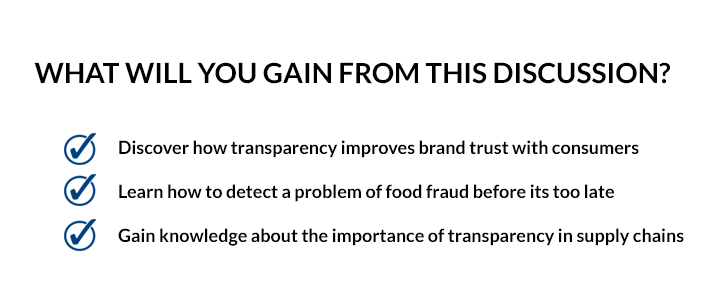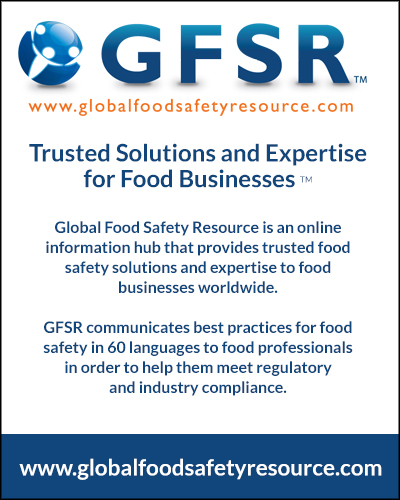Food Fraud: Protecting your Brand Through Transparency
Online Video Panel Discussion

 Food fraud originated as a way to extend a food’s primary ingredients for added profit. As our food supply becomes more globalized, fraudsters are using the importation process to take advantage of food companies wherever they can. According to the FDA, the number of adulterated food products they are seeing has tripled over the past 10 years. And, as supply chains become increasingly complex and fragmented, it is becoming harder to detect cases of adulteration. What’s more, some food companies seeking new ways to keep pricing down are outsourcing to suppliers who are tempted to substitute, sometimes at the cost of the safety and the integrity of the company’s brand.
Food fraud originated as a way to extend a food’s primary ingredients for added profit. As our food supply becomes more globalized, fraudsters are using the importation process to take advantage of food companies wherever they can. According to the FDA, the number of adulterated food products they are seeing has tripled over the past 10 years. And, as supply chains become increasingly complex and fragmented, it is becoming harder to detect cases of adulteration. What’s more, some food companies seeking new ways to keep pricing down are outsourcing to suppliers who are tempted to substitute, sometimes at the cost of the safety and the integrity of the company’s brand.
From olive oil, to honey and even horsemeat, consumers are unwittingly purchasing and consuming food that may have been adulterated or tampered with, and this can seriously compromise their health. As consumers become aware of these incidents through main stream and social media, they start to turn away from brands they once trusted, which can impact your food brand: food fraud can not only harm your consumers, it can also threaten your profits!
Tina Brillinger, GFSR’s CEO will Co-moderate the Panel Discussion with Dawn Van Dam


Tina Brillinger Dawn Van Dam
FEATURED PANELISTS INCLUDE THE FOLLOWING EXPERTS
|
|
 Dr. John Spink is the Director of the Food Fraud Initiative at Michigan State University (USA). His 2009 MSU Packaging PhD work was on Anti-Counterfeit Strategy and his broad research expands from Food Fraud to product fraud related business risks (including Enterprise Risk Management ERM and COSO), and a range of outreach activities that cover policy and trade issues. While conducting his research and outreach he has a full teaching load with graduate courses “Packaging for Food Safety,” “Anti-Counterfeiting and Product Protection (Food Fraud),” and” Quantifying Food Risk.” He is widely published in leading academic journals with important works such as “Defining the Public Health Threat of Food Fraud.” He was a co-author on “Food Fraud” in the first comprehensive Chinese language Food Safety textbook. His leadership positions include product fraud related activities with ISO, GFSI Food Fraud Think Tank, and U.S. Pharmacopeia (USP). Global activities include engagements with the European Commission, INTERPOL and Operation Opson, New Zealand MPI, and service as Advisor on Food Fraud to the Chinese National Center for Food Safety Risk Assessment (CFSA). Dr. John Spink is the Director of the Food Fraud Initiative at Michigan State University (USA). His 2009 MSU Packaging PhD work was on Anti-Counterfeit Strategy and his broad research expands from Food Fraud to product fraud related business risks (including Enterprise Risk Management ERM and COSO), and a range of outreach activities that cover policy and trade issues. While conducting his research and outreach he has a full teaching load with graduate courses “Packaging for Food Safety,” “Anti-Counterfeiting and Product Protection (Food Fraud),” and” Quantifying Food Risk.” He is widely published in leading academic journals with important works such as “Defining the Public Health Threat of Food Fraud.” He was a co-author on “Food Fraud” in the first comprehensive Chinese language Food Safety textbook. His leadership positions include product fraud related activities with ISO, GFSI Food Fraud Think Tank, and U.S. Pharmacopeia (USP). Global activities include engagements with the European Commission, INTERPOL and Operation Opson, New Zealand MPI, and service as Advisor on Food Fraud to the Chinese National Center for Food Safety Risk Assessment (CFSA).
|
 Yves REY is Senior Advisor to the DANONE Board of Directors, former Corporate Quality General Manager, DANONE Group & Former Chairman of the GFSI board (Global Food Safety Initiatives). Yves Rey is a French citizen and a graduate of ENSAIA, France. He holds MSc degrees in chemistry and biochemistry. He has more than 42 years’ experience in the world’s leading food, beverage and packaging companies in 10 different countries. Yves has been a longstanding member of the GFSI board (Global food Safety Initiatives) – from 2006 to 2011 — He was vice-chair from 2008 to 2011 and Chair from 2012 to 2014. Yves REY is Senior Advisor to the DANONE Board of Directors, former Corporate Quality General Manager, DANONE Group & Former Chairman of the GFSI board (Global Food Safety Initiatives). Yves Rey is a French citizen and a graduate of ENSAIA, France. He holds MSc degrees in chemistry and biochemistry. He has more than 42 years’ experience in the world’s leading food, beverage and packaging companies in 10 different countries. Yves has been a longstanding member of the GFSI board (Global food Safety Initiatives) – from 2006 to 2011 — He was vice-chair from 2008 to 2011 and Chair from 2012 to 2014.Yves also serves as Senior Advisor to the Asia-Pacific United Nations Office for Project Services for Smart Agriculture & Food Safety Industry Demonstration Zone and as the Executive Director of IFAAO – International Food Authenticity Assurance Organization |
|
|
|
|

**By registering for this panel discussion with GFSR you agree that your contact information can be shared with attending
sponsors or panelists who may wish to share knowledge about related products and services.

-
 FeaturedRisk management
The Cost of a Breach: What a Cyberattack Could Mean for Food Safety Recalls
FeaturedRisk management
The Cost of a Breach: What a Cyberattack Could Mean for Food Safety Recalls
-
 FeaturedRisk management
Securing the Food Chain: How ISO/IEC 27001 Strengthens Cybersecurity
FeaturedRisk management
Securing the Food Chain: How ISO/IEC 27001 Strengthens Cybersecurity
-
 FeaturedRisk management
Revolutionizing Food Safety Training: Breaking Out of the “Check-the-Box” Mentality
FeaturedRisk management
Revolutionizing Food Safety Training: Breaking Out of the “Check-the-Box” Mentality
-
 GFSI Standards
GFSI 2025: Building Trust, Tech-Forward Solutions, and Global Unity in Food Safety
GFSI Standards
GFSI 2025: Building Trust, Tech-Forward Solutions, and Global Unity in Food Safety
-
 FeaturedFood Safety
Integrated Pest Management: Strategies to Protect Your Brand’s Reputation
FeaturedFood Safety
Integrated Pest Management: Strategies to Protect Your Brand’s Reputation
-
 FeaturedFood Safety Culture & Training
No Open Door Policy: Challenges That Impact Pest Control in Food Processing Plants
FeaturedFood Safety Culture & Training
No Open Door Policy: Challenges That Impact Pest Control in Food Processing Plants










